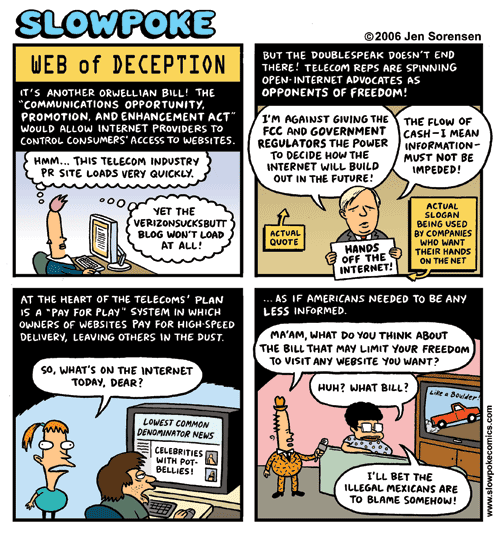Comcast’s announcement that it would implement a usage cap of 250GB per month comes on the heels of the company’s entanglements with the Federal Communications Commission, who spanked the nation’s largest cable operator for purposely interfering with Internet traffic Comcast felt constituted a problem on its network – namely torrent traffic.
Cable operators face the evolution of cable modem service from something primarily valued by a minority of Internet enthusiasts into a “must-have” product for more and more Americans. And with the spectacular growth of the Internet, new applications are being introduced daily that are specifically designed to take advantage of the speeds that broadband promises to provide.

Unparalleled greed means not being able to fit all of the cash we're going to make off you into just one briefcase!
Just 24 months ago, the “problem” was peer-to-peer traffic, such as file sharing networks and torrent applications. Customers fired up their trading software and often let it run for hours on end as they attempted to grab the latest software, TV show, or movie. File sharing software can consume an enormous amount of bandwidth, as users share files with one another, uploading and downloading pieces of a favorite TV show or movie until a complete file is assembled. Good etiquette dictates leaving the software running even longer to help make sure everyone else in the queue can complete their download as well.
The result was a lot of traffic going in both directions. Most networks in the United States are designed to handle people receiving more files than sending them, and file sharing software began to challenge that paradigm.
Soon enough, broadband providers began complaining that this kind of traffic was tying up their networks, designed for what company officials thought average customers would do with their Internet connection. People consuming a lot of bandwidth downloading music or movies required operators to spend more money to expand and enhance their networks.
Ironically, the same companies complaining about file sharing created their own “problem” by marketing cable modem service as the fastest way to… download movies and music! DSL, they said, kept you waiting for your favorite show while cable modem service guarantees your show will be ready the moment the popcorn is popped.
The earliest theories of the artificial “bandwidth crisis” offered by companies annoyed with having to keep up with the demands of their customers, suggested that file sharing traffic would be the death of the Internet as we know it, as torrent traffic completely clogged the network, consuming any and all available bandwidth. Godzilla’s destructive powers had nothing on file sharing, which could literally create a global Internet crisis.
Comcast decided it could address the torrent traffic problem by inspecting the bits and bytes of traffic running across its network and, at certain peak times, substantially slow down the delivery of that traffic. Their theory suggested that this would protect other customers from the neighbors eating up more than their fair share of bandwidth. In practice, it essentially crippled the usefulness of running any torrent application.

Comcast paid people off the street to fill one FCC hearing room, keeping conscious members of the public out. (Courtesy: Free Press)
The FCC would have none of it, telling Comcast it cannot discriminate against the traffic being carried over its network. The answer to the traffic problem was to build better roads to manage the traffic.
Instead of simply agreeing to keep up with demand, Comcast has now approached this “bandwidth crisis” from a different angle. It has simply put a limit on the amount of traffic each subscriber can utilize on its network during a 30 day period, regardless of what that traffic represents.
Comcast’s suggested limits on bandwidth gave a number of broadband providers the idea that they, too, could slap caps on their customers. And since the usage cap question was first raised nationally earlier this year, the suggested caps have gotten lower and lower from each subsequent company testing or implementing them.
Cox has “informal” caps of up to 75GB per month in some areas. Time-Warner began testing caps of up to 40GB per month in Beaumont, Texas. Frontier announced a forthcoming 5GB usage cap, which is among the lowest in the United States. In Canada, companies have gone even lower with caps like Rogers’ 400MB monthly cap for their $60 wireless Internet plan for iPhone owners. Canadians were so outraged by that cap, Rogers eventually had to relent and create a 6GB monthly service package for $30.
Usage capping cable and DSL providers are in a race to the bottom as they try to learn how low they can go without creating mass defections among their customers.
Some Comcast customers have told Stop the Cap! they are relieved that at least they are on the top of the usage cap pile with Comcast’s 250GB cap, which at first glance appears generous. In fact, only a small minority of their customers will currently exceed that kind of usage cap.
But regardless of how generous a usage cap appears, it still raises a lot of questions.
1. If informal efforts to control “bandwidth hogs” have been so successful, why bother with a cap at all?
For several years, Comcast has informally enforced its own internal interpretation of a usage cap with customers who consumed incredible amounts of bandwidth, usually as a result of running a home-based torrent/peer-to-peer file server, web server, or other application that runs contrary to the residential acceptable use policy. Company officials send warnings to customers who consume hundreds of gigabytes of bandwidth every month. Comcast’s own public statements indicate such warnings are usually successful.
“We know from experience the vast majority of customers we ask to curb usage do so voluntarily,” Comcast notes on their website.
So why bother the 99% of the rest of your customers with a formal usage cap if they don’t come anywhere close to exceeding it? It’s awfully hard to convince people of a broadband bandwidth crisis if you also claim the overwhelming majority of your customers consume less than 5% of your proposed cap!
2. While most people won’t come close to 250GB of usage, unless they are backing up their files through an online backup service or are downloading a very large number of files, the usage cap that seems generous today is draconian tomorrow.
The biggest problem usage caps bring to the table is the artificial drag they create on innovation. In the global race to be leaders in the emerging Internet economy, the United States was in a strong position to lead the world in high bandwidth next generation applications like streamed high definition video programming, store-and-forward video on demand and Tivo-like recording, storing TV shows online and delivering them to you on demand, online file backup services, high quality video teleconferencing, new “cable-TV”-like services over broadband which compete with cable and satellite providers, and more applications yet to be dreamed up.
Just ten years ago, when most cable modem service began to really get off the ground, the Internet of the late 1990s was very different from the Internet of today. A usage cap based on what customers did then would likely be under one gigabyte a month, as users satisfied themselves with low bitrate RealAudio streams, slideshow-like online video, and a World Wide Web considered primitive by today’s standards.
As broadband Internet became established in a growing number of consumers’ homes, the applications to take advantage of the increased bandwidth followed. Voice Over IP telephone services, high quality streamed audio and video, and online file storage would never have been developed based on the Internet of the late 90s, and would never have gotten off the ground in a world with usage caps.
High definition streaming video consumes many gigabytes per hour. It’s among the very first exciting applications being made available to consumers with broadband connections, but will die an early death if usage caps are the order of the day.
3. Usage caps are anti-competitive and convenient, particularly as those who mandate them have a direct interest in limiting the potential of competitors that exist today or cannot get start-up funding tomorrow.
Usage caps actually do nothing to solve the “bandwidth crisis” the cable and DSL companies suggest are on the verge of killing the Internet. They merely restrict the natural growth of traffic, allowing companies to pocket higher profits and spend less on expanding and enhancing their networks.

Sky Angel, a "cable"-like system for Christian households, delivers more than 65 channels over broadband. How can they survive usage caps?
More importantly, cable companies conveniently put a stop to plans to bring competing multichannel video packages to consumers over the Internet. The “cable company online” model exists today with providers like SkyAngel, which delivers Christian and secular “pro-family” programming to its customers over a set top box connected to the Internet. More than 65 channels ranging from TBN to Animal Planet and The Weather Channel reach their customers over broadband for a monthly subscription fee. SkyAngel’s service is in peril in a world with usage caps that will limit viewing to as little as a few hours per month before exceeding usage caps.
Netflix and some satellite dish companies offer video on demand programming utilizing the Internet to deliver the programming to subscribers. In a world with usage caps, you will be stuck watching those programs only from your cable company or local video rental store.
Future businesses that seek start-up funding to build the high bandwidth applications of the future will get a guaranteed rejection once potential investors learn that consumers will be unable to take advantage of those applications because they will exceed their usage caps and have their service shut off.
Of course, the convenient exception to the usage cap world comes from companies that partner with that cable or DSL company.
Frontier has already announced it will exempt its partners from their 5GB usage cap. ESPN360 and their online backup service preferred partner will enjoy the benefits of an uneven playing field in the marketplace because they aren’t subject to a usage cap. Everyone else is.
What about Time-Warner and Comcast? Will their partner services also enjoy exemptions from usage caps while everyone else is forced out of business when customers discover that using them puts them over their monthly limit?
What about Voice Over IP? Cable companies are giving telephone companies a real headache by offering telephone service over cable lines at highly competitive pricing. But independent companies like Vonage and MagicJack don’t enjoy the benefit of being exempted from usage caps limiting the number of calls you can make or receive. If you are owned or are partnered with a cable or DSL company, your service gets a free pass from the usage cap. Everyone else is potentially buried by it.
4. The punitive measures suggested for those that violate usage caps scare customers into using their connections even less, to the great benefit of the bottom line of the broadband provider.
What’s the best way to make sure your customers use their connections as little as possible? Impose outrageous penalties for exceeding usage caps. Comcast proposes to send a warning letter first, but then potentially turn off a customer’s service for six months to an entire year if they dare to use their broadband service more than the company wants.
Other providers have discovered the tangible benefits of the “penalty rate.” It guarantees striking fear into the hearts of your most hearty customers, when to exceed the cap means paying 50 cents per MEGABYTE for traffic above and beyond your capped limit, as Rogers charges Canadians right now.
Download that one hour episode of CSI: Miami, and pay up to $175 in penalties on your next bill. Ouch! Imagine the conversation at that family’s dinner table after your son or daughter downloaded a TV show before you had a chance to tell them you were at your monthly limit. Horatio Caine can then come and solve the homicide at your house.
It all comes down to paying the same or more money for less service. And if you are potentially going to have your service cut off or outrageous overage fees billed for exceeding that cap, you will make darn sure you don’t even come close to it out of fear of exceeding it.
Being in the “bandwidth shortage business” means more profits for you, less service for your customers.
The best part about imposing usage caps is that you get to invent word of a “bandwidth crisis” to justify penalizing your customers, provide absolutely no independent evidence to prove such a crisis exists, reduce your investment in keeping your network up with the times, and help protect your product lines from pesky competition.
After all, your cable modem or DSL service was among your most profitable products before usage caps were even proposed, but now you can make even more money. And if a competitor ever does arrive without usage caps, you can just drop them and go back to making a decent profit instead of one that rivals the oil industry.


 Subscribe
Subscribe




